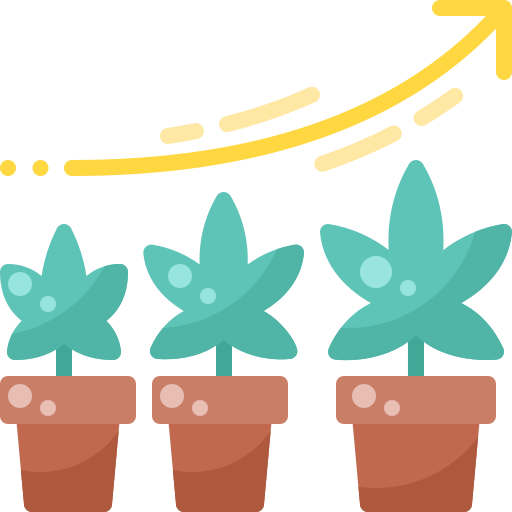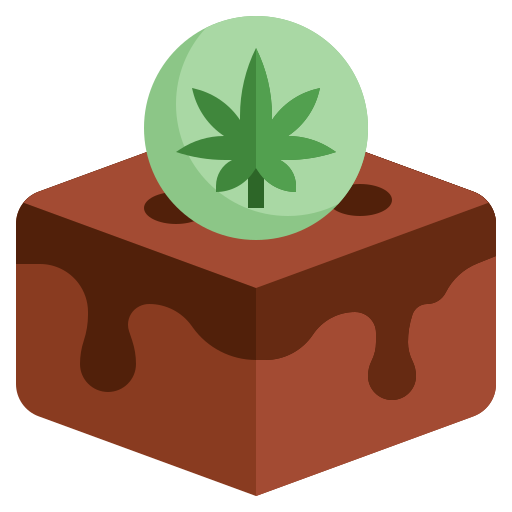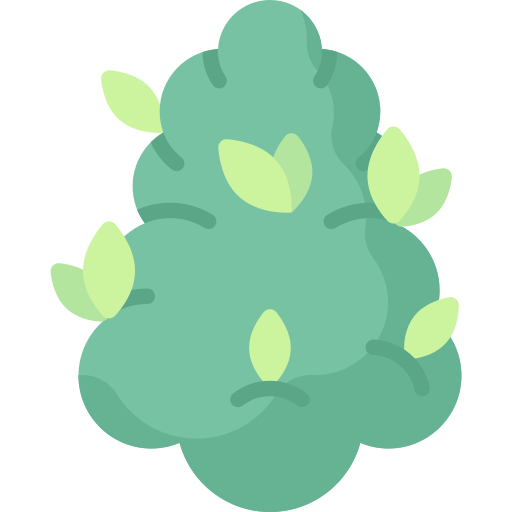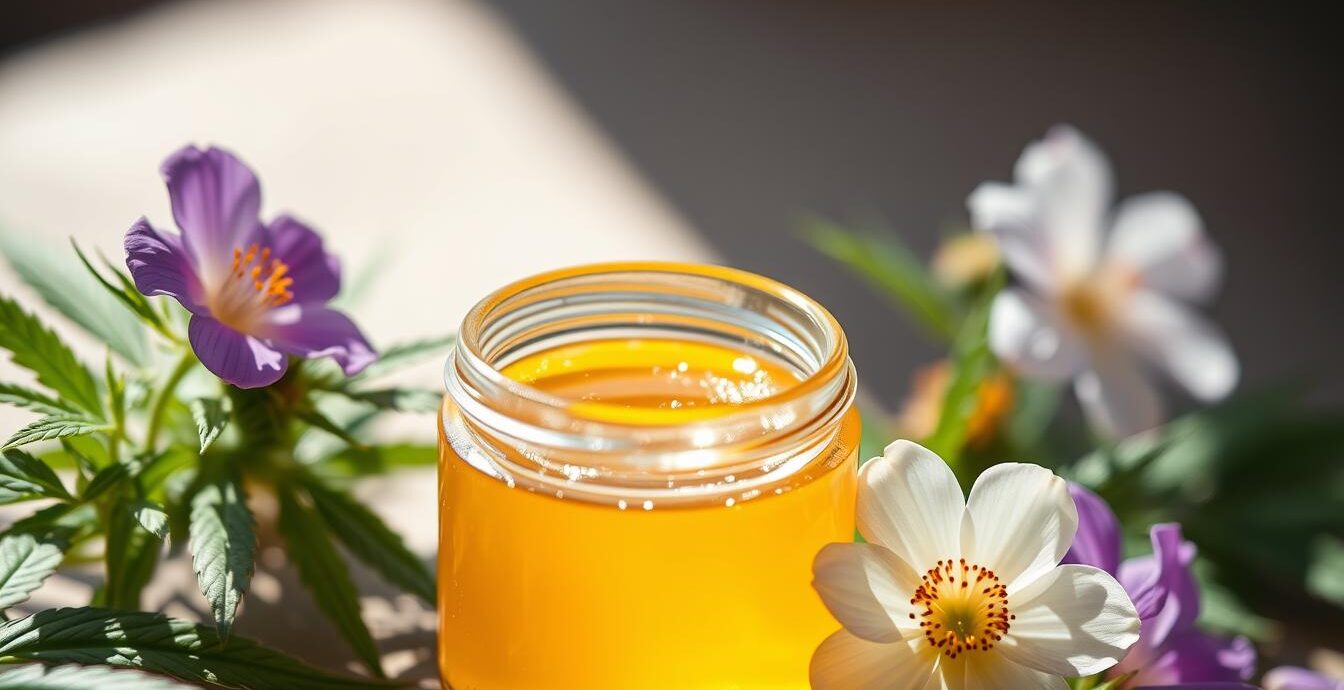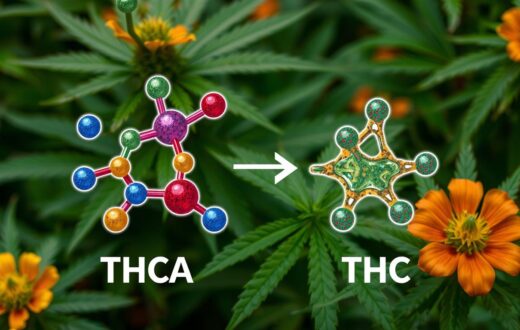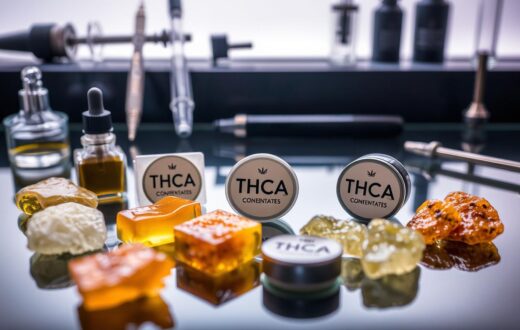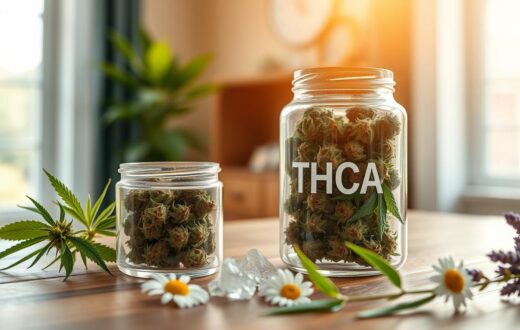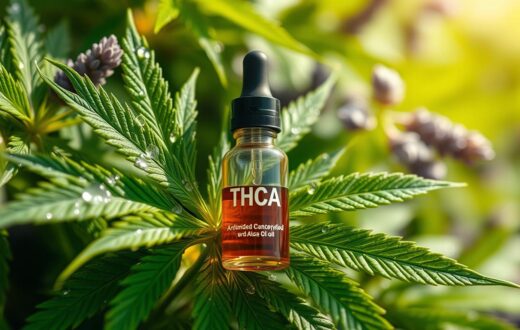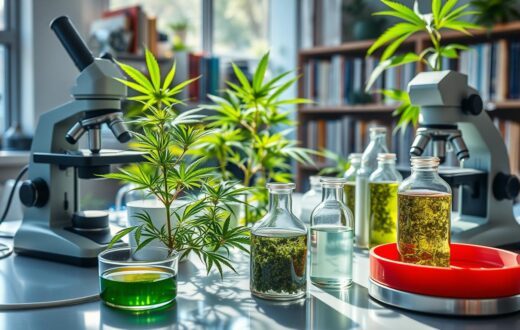Ever wondered why raw cannabis doesn’t get you high? The answer lies in a fascinating compound called THCA. This non-psychoactive cannabinoid is abundant in fresh hemp plants, but its full potential is only beginning to be understood.
Full-spectrum THCA products are making waves in the cannabis world. These hemp extracts preserve the plant’s natural profile, including a wide range of cannabinoids and terpenes. But what sets them apart from other cannabis products?
THCA, or tetrahydrocannabinolic acid, is the precursor to THC. It’s found in raw cannabis and offers potential therapeutic benefits without the high. As interest in cannabinoids grows, full-spectrum THCA products are becoming more available in dispensaries across the United States.
Let’s dive into the world of full-spectrum THCA and explore what it means for cannabis consumers and the future of hemp-derived products. From its unique properties to its potential health benefits, there’s a lot to unpack about this intriguing compound.
Understanding THCA and Its Benefits
THCA is a special cannabis compound that’s becoming popular in the wellness world. It’s found in raw cannabis plants and has health benefits without the psychoactive effects of THC.
What is THCA?
THCA, or tetrahydrocannabinolic acid, is a non-psychoactive cannabinoid in hemp and cannabis. It’s the precursor to THC, the main psychoactive compound in cannabis. THCA forms when CBGA breaks down, creating both THCA and CBDA.
How THCA Differs from THC
Unlike THC, THCA doesn’t cause a high. It stays non-psychoactive until it’s heated, a process called decarboxylation. This makes THCA a good choice for those looking for thc-free wellness benefits from cannabis compounds.
Potential Health Benefits of THCA
Research shows THCA may have several health benefits. It could help reduce inflammation and protect the brain. A 2017 study found THCA has strong neuroprotective activity.
It may also help with nausea relief. Studies show it reduced nausea symptoms in rats at lower doses than THC. These findings suggest THCA’s potential in enhancing overall wellness through natural, plant-based remedies.
The Science Behind Full-Spectrum Extracts
Full-spectrum extracts capture the essence of hemp plants. They contain a wide range of cannabinoids and terpenes. This offers a complete plant profile. The science behind these products is fascinating and complex.
What Constitutes a Full-Spectrum Extract?
A full-spectrum extract includes all natural compounds found in hemp. It has cannabinoids like CBD and THCA, along with terpenes and other beneficial plant materials. The goal is to keep the plant’s original composition as much as possible.
The Role of Terpenes and Cannabinoids
Terpenes and cannabinoids work together in full-spectrum extracts. Terpenes give hemp its distinct aroma and flavor. They enhance the effects of cannabinoids, creating a synergy known as the “entourage effect.” This may boost the extract’s therapeutic potential.
Extraction Methods Explained
Several methods exist for creating full-spectrum extracts. CO2 extraction is considered the gold standard, producing high-quality results. Ethanol extraction is cost-effective and preserves a broad range of plant compounds. Hydrocarbon extraction, using solvents like butane, requires careful post-processing. Each method has its advantages, impacting the final product’s quality and composition.
Full-Spectrum THCA vs. Other Cannabis Products
Cannabis compounds come in many forms, each with its own benefits. Full-spectrum THCA products are special because of their complete makeup. Let’s look at how they differ and what effects they have.
Comparison with Isolate and Broad-Spectrum
THCA isolates only have THCA. Broad-spectrum products have many cannabinoids but no THC. Full-spectrum THCA gives you the whole plant, which might offer better effects. This is called the “entourage effect,” where all parts of the plant work together.
Effects of Each Type of Extract
Isolates focus on one compound’s benefits. Broad-spectrum extracts have many cannabinoids without THC’s high. Full-spectrum THCA has the most variety, including terpenes and flavonoids. This mix might improve wellness and reduce side effects.
Choosing the Right Product for You
Choosing the right hemp extract depends on what you need. If you want specific effects without THC, isolates or broad-spectrum might be best. For the full plant benefits, full-spectrum THCA is a good choice. Think about your wellness goals, desired effects, and legal issues when picking.
Legality of Full-Spectrum THCA in the United States
The laws about full spectrum thca in the US are complex and change by state. The 2018 Farm Bill made legal hemp products with less than 0.3% delta-9 THC. But, the rules on THCA are still unclear.
Current Regulations and Legal Status
Under federal law, legal hemp has 0.3% or less delta-9 THC by dry weight. This has led to more THCA products, as THCA is not psychoactive and is found naturally in hemp. Yet, the DEA says that when THCA is converted to delta-9 THC, it could be illegal.
State-by-State Overview
THCA laws differ greatly from state to state. For example, Florida lets THCA outside its medical cannabis program. California also allows THCA products with less than 0.3% delta-9 THC. But, states like Arkansas and Minnesota ban THCA products altogether. This makes it hard for both consumers and businesses.
Implications for Consumers
For those who buy or use full spectrum thca products, understanding the laws is key. It’s important to check local laws before buying. Some states measure THCA in milligrams or as a percentage of the total product. As the industry waits for the 2023 Farm Bill, staying updated on state laws is crucial.
How to Use Full-Spectrum THCA
Full-spectrum THCA products have many wellness benefits. They contain over 500 known cannabinoids. Each one can have its own health benefits. THCA is found in raw cannabis flowers and doesn’t get you high until it’s heated or exposed to light.
Various Consumption Methods
There are many ways to use THCA. Raw cannabis flowers keep THCA in its natural form. Tinctures let you control how much you take. Edibles give a longer-lasting effect. For fast relief, some like smoking or vaping THCA-rich flower.
Dosage Recommendations
Start with a small dose of full-spectrum THCA for wellness. Everyone reacts differently to cannabis compounds. Slowly increase your dose to find what works best for you. THCA vapes and pre-rolls work fast, while edibles take longer but last longer.
Safety Precautions
Always talk to a healthcare professional before trying THCA products, especially if you’re on other meds. Don’t use it if you’re pregnant or breastfeeding. Remember, heating THCA turns it into THC, which can make you feel high. If you feel anxious, try CBD or CBG instead. Also, check local laws on THCA use.
Potential Side Effects and Risks
THCA has wellness benefits, but it’s important to know its side effects. It’s usually well-tolerated, but some might feel a bit uncomfortable. Let’s look at the known side effects and when to be careful.
Known Side Effects of THCA
THCA can cause dry mouth and itchy eyes. Some people might feel tired or sleepy after using it. Rarely, it can lead to digestive problems. These effects are usually mild and don’t last long.
Remember, THCA doesn’t make you high. This makes it a good choice for those looking for thc-free wellness options.
Risks of Misuse or Overdose
The risks of misusing THCA are lower than THC because it doesn’t make you high. But, when heated, it can turn into THC, which can impair you. Always use THCA products as directed and buy from trusted sources for quality and safety.
When to Avoid Using THCA
Don’t use THCA if you’re sensitive to cannabis or get drug tested. Pregnant or breastfeeding women should talk to a doctor first. If you have health issues, it’s best to check with a doctor before using THCA.
Full-Spectrum THCA and the Endocannabinoid System
The endocannabinoid system (ECS) is a complex network in our bodies. It helps maintain balance and plays a key role in many functions. Full-spectrum THCA, a compound found in cannabis, interacts with this system in unique ways.
Role of the Endocannabinoid System
The ECS acts like a body-wide communication network. It has receptors throughout our body and brain. These receptors respond to cannabinoids, both those our body makes and those from plants like cannabis.
This system helps keep our body in balance. It supports overall wellness.
How THCA Interacts with Endocannabinoid Receptors
THCA is the raw form of THC found in fresh cannabis plants. Unlike THC, it doesn’t make you feel high. But it still affects the ECS.
THCA may work with CB1 and CB2 receptors in the ECS. This interaction could explain some of its potential health benefits. Like reducing inflammation.
Importance of Whole Plant Medicine
Full-spectrum THCA products contain more than just THCA. They have other cannabinoids, terpenes, and plant compounds too. This mix may work better than isolated THCA alone.
It’s called the “entourage effect.” The idea is that all these parts work together. Potentially boosting wellness benefits. This whole-plant approach might offer more complete support for the ECS and overall health.
Research and Studies on Full-Spectrum THCA
The world of cannabis compounds is changing fast. New studies are showing how they can help our health. Full-spectrum THCA, a non-psychoactive part of THC, is getting a lot of attention.
Current Research Findings
Recent studies have given us interesting insights into THCA. A big study with 264 cannabis plants found a way to accurately predict THCA levels. They got it right 78% of the time, with an average error of just 13%.
Promising Areas of Study
THCA might help with neurodevelopmental disorders, which are becoming more common. These disorders are very costly. Researchers think THCA could help with epilepsy and other brain diseases.
Studies show that even a little THC can affect our brains. Only 1% of THC gets past the blood-brain barrier.
Gaps in Knowledge
There’s still a lot we don’t know about full-spectrum THCA. Scientists are trying to understand how different cannabis compounds work together. They’re also breeding plants with more THCA and less THC.
As research goes on, we’ll learn more about THCA’s long-term effects. We’ll also find out the best ways to use it for health.
Full-Spectrum THCA in the Market
The market for full spectrum thca products is growing fast. Fans of hemp extract have many choices. Brands are now offering top-quality products that meet different tastes.
Popular Brands and Products
Area 52 is known for their THCA Exotic Flower, with 35% THCA. Finest Labs has nugs with about 25% THCA. Best Buds High Potency THCA Flower has levels from 20% to 34%.
Arete Hemp and Cheef Botanicals also offer strong options. Their THCA levels range from 20% to 35%.
Evaluating Quality
When looking for full spectrum thca products, check for third-party lab tests. These tests show the cannabinoid content and ensure the product is safe. Look at the product’s appearance, smell, feel, and how it’s trimmed.
Coastal Green Wellness focuses on flavor and looks over THCA percentages when picking strains.
Price and Value Comparison
Prices for hemp extract products vary. They depend on the potency and quality. High-quality THCA strains usually cost more.
When comparing, think about the whole cannabinoid profile, not just THCA. Some brands offer hybrid, sativa, and indica options. Keep in mind that shipping internationally can add to the cost.
The Future of Full-Spectrum THCA
The world of cannabis is changing fast. Full-spectrum THCA is leading this change, opening up new paths in wellness. As studies continue, we learn more about this non-psychoactive compound and its benefits.
Research and Development Trends
Scientists are studying THCA closely. They’re looking into its anti-inflammatory and brain-protective effects. This could lead to new treatments for arthritis, epilepsy, and brain diseases. The aim is to use THCA’s benefits without the high from THC.
Growing Consumer Awareness
More people are learning about THCA and its wellness benefits. They’re looking for natural options that don’t get you high. This growing interest is driving the market to create better THCA products. Education is key as people explore the complex world of cannabis.
New Product Possibilities
The future is bright for THCA innovation. We might see new ways to take THCA that keep it in its raw form. Products could be made to target specific health issues. As the industry grows, so does the chance for personalized THCA products.
Full-spectrum THCA is set to be a big player in cannabis wellness. As research and knowledge grow, we can expect big changes. The journey of understanding and using THCA is just starting, and the possibilities are endless.
Combating Misinformation About THCA
Many myths surround cannabis compounds like THCA. Some believe THCA causes a high, but it’s actually non-psychoactive until heated. Knowing this clears up misconceptions about thc-free products.
Understanding Common Myths
One common myth is that all cannabis compounds are intoxicating. But, the Cannabis sativa L. plant has about 545 secondary metabolites, only some of which are psychoactive. THCA, found in raw cannabis, doesn’t cause a high unless it’s heated.
Importance of Reliable Sources
It’s key to rely on scientific research to fight misinformation. Studies show cannabis has about 144 bioactive cannabinoids. These findings come from trusted institutions studying the plant’s complex makeup. For accurate info on thc-free options, look to peer-reviewed journals and recognized cannabis research centers.
How to Stay Informed
Keeping up with cannabis compounds requires ongoing learning. Follow updates from established cannabis research institutions. Subscribe to industry publications that cite credible sources. Also, talk to certified healthcare professionals in cannabinoid medicine. By seeking reliable information, you can confidently navigate the complex world of cannabis.
Feedback and User Experiences
People using full spectrum thca products have shared many experiences. They often talk about how it helps with pain and relaxation. Online forums are filled with conversations about different strains and their effects on health.
Consumer Stories
Many users say full spectrum thca has changed their lives. One person mentioned, “Northern Lights helps me relax after a long day.” Another said, “Sour Diesel gives me the energy I need.” These stories show how different strains can help with various health needs.
Building a Community
Online platforms are where people share their full spectrum thca experiences. They talk about the strength of different strains, their effects, and how much to use. This helps new users find the right products for their health goals.
The Power of Reviews
User reviews are very important in the full spectrum thca market. They give real-life views on how well products work. For example, OG Kush and Granddaddy Purple are often praised for their strong effects. These reviews help others make better choices for their health.
Keeping a journal of strains is also popular. It helps users track how they react to different full spectrum thca products. This way, they can adjust their health routine as needed.
Full-Spectrum THCA and Lifestyle Integration
Adding full-spectrum THCA to your wellness routine can change your health for the better. This hemp extract combines over 100 cannabinoids from cannabis plants. Unlike THC, THCA doesn’t cause a “high,” making it great for natural wellness.
Incorporating THCA into Wellness Routines
It’s easy to add THCA to your daily life. Many people use it by vaping or taking tinctures. THCA can help with relaxation, protect your brain, and ease discomfort.
It may also help with stomach issues and nausea. This makes it a useful tool for your wellness.
Considerations for Holistic Health
Think about how THCA fits into your health goals. Its anti-inflammatory and antioxidant effects can support your skin and manage chronic conditions. But remember, THCA isn’t a magic solution.
Using it with a healthy diet, exercise, and stress management can boost its benefits.
Personalizing Your Experience
Everyone reacts differently to cannabinoids. Start with small doses and increase as needed. Notice how THCA affects your mood, energy, and overall health.
Some like using it in the evening for calm, while others use it all day. The secret to a good wellness routine is being consistent and making it your own.
Conclusion: The Emerging Landscape of Full-Spectrum THCA
Full spectrum THCA is transforming the cannabis wellness world. It brings potential benefits without the high of THC. As studies expand, we see more products that use THCA and other cannabinoids effectively.
Summary of Key Points
THCA is found in raw cannabis plants. It has shown to be anti-inflammatory, neuroprotective, and anti-emetic. It’s like THC but doesn’t get you high unless heated.
The 2018 Farm Bill made hemp legal with less than 0.3% Delta-9 THC. This opened the door for THCA products.
Future Perspectives on THCA
The future of THCA looks bright. More states are seeing its value, legalizing it for medical or recreational use. We’ll see more research and new uses for THCA in wellness.
Quality control will be key as the market grows.
Final Thoughts on Full-Spectrum Products
Full-spectrum THCA products offer a holistic wellness approach. They have various cannabinoids that work together for better benefits. As people seek natural solutions, these products could become more important in health routines.
Remember to check local laws and talk to experts before trying THCA products.
Disclaimer
At Marifinder, we’re dedicated to sharing accurate info on legal hemp and wellness. Our goal is to educate, not to replace medical advice. We gather our info from trusted scientific sources and experts to give you a full view of full-spectrum THCA.
Understanding the Purpose of This Content
This article is for information only. We talk about THCA’s possible benefits, like its anti-inflammatory effects and how it works with PPAR gamma receptors. But remember, research is still going on. We aim to give you a balanced look at THCA’s role in wellness, without making medical claims.
Resource Acknowledgements
We’ve looked at scientific studies on THCA’s neuroprotective effects and its role as a PPARγ agonist. We’ve also included info from trusted makers like Akashic Labs about their THCA products. Our content follows current legal standards, like the 0.3% THC limit for legal hemp products.
Importance of Consulting Professionals
Before adding THCA or any cannabis product to your wellness routine, talk to a qualified healthcare professional. This is especially important if you have health issues or are on medications. Remember, THCA doesn’t cause psychoactive effects like THC, but it’s still a strong compound that affects your body’s systems.
